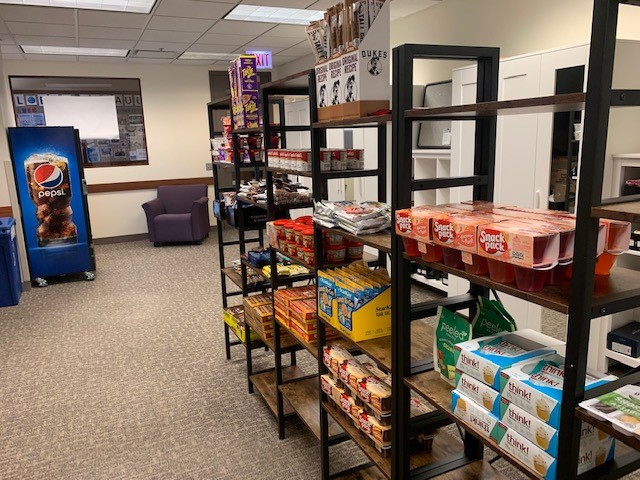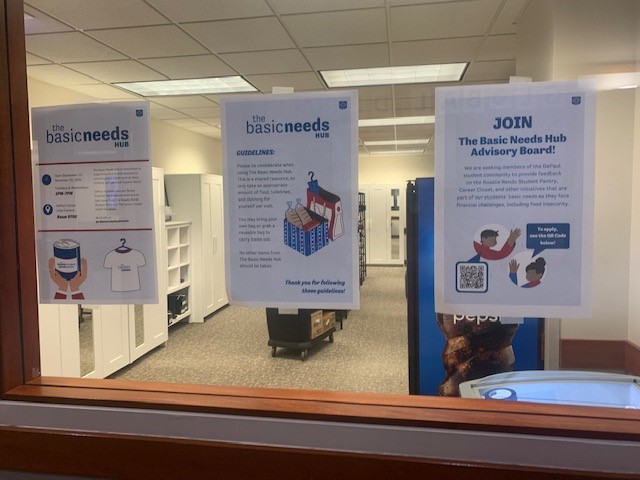In February of 2020, DePaul University opened a pantry out of a storage closet on the third floor of its Lincoln Park campus. Primarily launched to combat food insecurity, it provided a safe space for students to get assistance in one location and an alternative to the many generous departments across campus that had their own small closets or drawers filled with charitable items.
Even when the campus shut down the following month because of COVID-19, DePaul’s pantry stayed open. Over the next year, the need increased and donations poured in, sparking conversations about expansion. Jen Fox, associate director of Strategy, Assessment & Initiatives in DePaul housing, found the group Swipe Out Hunger online and began assessing the possibilities. With DePaul already providing food, towels, sheets, backpacks and a Career Closet with clothing, it was doing far more than the average pantry and needed a name to new reflect that.
The Basic Needs Hub fit perfectly. Now in two locations in a new spot on the first floor of Lincoln Park and on its Loop campus—each is open to serve all enrolled students. A simple swipe gives them access to a variety of perishable and non-perishable items. They can take what they need, although they are encouraged not to overindulge since others use the space, too. It is thriving, thanks to generous individual donors, and serving more students than it could have imagined. But it wants to do more if it can.
“It wasn’t known to students that we offered all of these services, so we worked to build that and we’re still building,” Fox says. “The important thing we’re adding this year is a student advisory board, so we can really meet the students where they are, whether that be specific kinds of foods—halal or vegan—or whatever type of brands they’re interested in. We don’t want students to be concerned with these items so that they can focus on their academics and their friendships.”
As many as 50% of college students nationally have experienced some food insecurity and struggled to afford basic needs items during the COVID pandemic. Chicago has been one of the communities slowest to reopen and recover. Rick Moreci, director of Housing, Dining & Student Centers at DePaul, notes that over the course of the past year, there have been over 3,000 swipes for students looking for basic needs assistance.
“The usage since we opened in 2020 has definitely gone up,” Moreci says. “We’re doing a good job of communicating around our campuses that this resource is available. I don’t know that there’s necessarily more need, but more students know [they are here]. The future of this is in many ways unwritten. Not only is there overall university support from our leadership, but there’s also the support of faculty and staff across the university who literally brought groceries to us; who have asked us how they can help. You just can’t even measure that. It just shows the spirit of this place and what we’re about. The outpouring of support was something I was not ready for.”

What’s in the hub?
While Fox and Moreci have been instrumental in the development and oversights of the Basic Needs Hubs, because their roles stretch beyond those areas there is a student employee at each who is tasked with ensuring operations run smoothly. Wanting to give students even more of a voice in the process, DePaul has moved to create a board comprised of those dedicated to the cause.
“The advisory board will hopefully make sure we’re doing the work in the most intentional way, that we’re sticking with DePaul’s mission,” Fox says. “We don’t know if we’re going to be working with families; if we are going to provide diapers and formula. Are those things that we need to look at? The hope is to use the students’ voices to propel us forward, working with different departments and organizations to do some drives to get more items that students really want and need.”
More from UB: Colleges fight to end food insecurity, 9 potential solutions
One immediate need that DePaul’s team is trying to boost is that of toiletries, which are both donated and purchased, Fox says. Fresh items are also at a premium as the pantries get stocked once per week at the smaller Loop and twice at Lincoln Park, which is open three days a week. Nonetheless, the variety on hand is pretty amazing thanks to the Career Closet and partnerships with its Health Promotion and Wellness Office and student groups. Aside from expansive food selections that include frozen items, the Hubs feature over-the-counter COVID tests, career clothes and accessories, dress shoes, winter clothes and boots.
As for entry, the swipe gets them through the doors, and students can select what they need. “Some schools, you order it and they provide it to you,” Fox says. “We wanted to be a space where students felt safe and not necessarily being watched over with what they do. So the pantry and the Career Closet are open to students during the hours that they’re open, without questions.”

Of course, as needs continue to remain high or even expand, DePaul’s team must be watchful of donations coming in. “We’re growing fast,” Moreci says. “That also means making sure that we’re growing at the right pace so that we are meeting the needs of the students without getting too overwhelmed.”
DePaul’s expanded efforts to go beyond a simple pantry show what can be achieved if institutions put some might behind their initiatives. But it does take time, resources and support. For colleges and universities that might already have pantries but are looking to grow to serve students in a basic needs capacity, the two DePaul leaders shared some guidance.
Fox says three things are important when launching a needs-type facility for students:
- Lean on others who have Hubs, like DePaul, can provide a strong example of the types of resources and support to operate and generate ideas about different kinds of donations. “I Googled basic needs hubs and found a couple of locations that were doing it.”
- Turn to Swipe Out Hunger, which has an abundance of ideas and guides to starting a pantry or needs hub. From that, DePaul not only launched its Hub but pulled together and worked with K-12 to help them get theirs going.
- Reach out to regional organizations or those connected to higher education who can help find resources.
“My advice for any institution looking to do this is, A. yes, do it because the need absolutely exists,” Moreci says. “But B, talk to your campus partners. The pandemic propelled us much faster than we expected to grow. Had we not had a year of conversations leading up to opening our very first pantry and bringing in partners—from the Dean of Students and faculty, and health promotion and wellness—I don’t think we’d be where we’re at today. No one or two people, even if they’re the best-intentioned, most passionate people on the face of the planet, can do this work without having a support network.”







